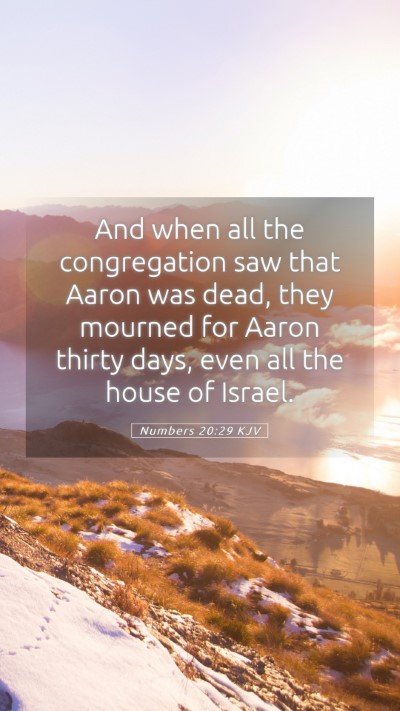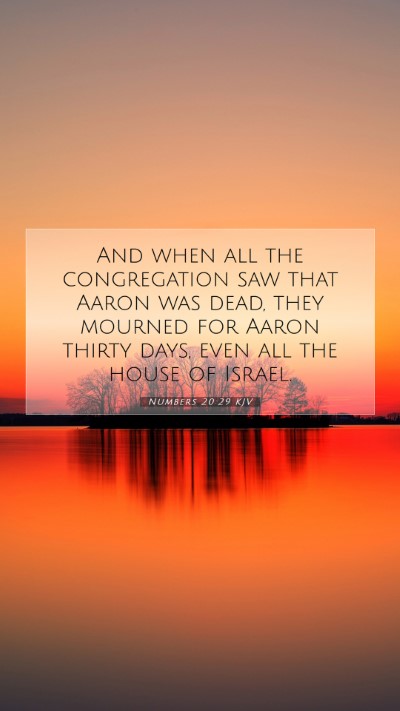Understanding Numbers 20:29
Numbers 20:29 states: "And when all the congregation saw that Aaron was dead, they mourned for Aaron thirty days, even all the house of Israel."
Bible Verse Explanation
This verse marks a significant moment in the narrative of the Israelites during their journey in the wilderness. The death of Aaron, the high priest and brother of Moses, is a solemn event reflecting the end of an era for God's chosen people.
Bible Verse Meanings
From various commentaries, the significance of this passage can be elaborated as follows:
-
Significance of Aaron's Death:
As noted in Matthew Henry's Commentary, Aaron served as a mediator between God and the people. His death symbolizes the loss of direct leadership and intercession. The lengthy mourning period reflects the deep respect and love the Israelites had for him.
-
Community Grief:
Albert Barnes emphasizes that the mourning of the entire house of Israel highlights the sense of community among the Israelites. This collective grief showcases their unity and recognition of who Aaron was to them, both spiritually and socially.
-
Transition of Leadership:
Adam Clarke points out that Aaron's position wasn't merely familial; it involved spiritual oversight. His passing led to changes in leadership dynamics, as the Israelites would now look to subsequent leaders for guidance, especially with Joshua now rising as a prominent figure.
Bible Verse Interpretations
The interpretation of Numbers 20:29 can be understood through multiple lenses:
-
Historical Context:
The Israelites were wandering in the wilderness after their exodus from Egypt. This period was marked by trials and tribulations, and the leadership of Aaron was essential in maintaining their faith and rituals.
-
Spiritual Significance:
This passage serves as a reminder of the transient nature of earthly leaders and human life. As mentioned in biblical commentary, it urges readers to consider the legacy left behind and the continuity of God's work through different leaders.
Biblical Exegesis
When engaging in biblical exegesis, analyzing Numbers 20:29 involves understanding how this event fits within the larger narrative of the Exodus and the Israelite's journey to the Promised Land:
-
The Role of Mourning:
Mourning as described in this verse serves not only as an expression of sorrow but also as a moment of reflection upon Aaron's life and contributions. The fact that mourning lasted thirty days is significant, aligning with cultural practices of the time.
-
Prophetic Underpinnings:
Without Aaron, his role as the primary intercessor before God becomes pivotal in assessing future events and the Israelites' reliance on future leaders, especially as they approach new challenges in their wandering.
Application to Daily Life
From a practical standpoint, the reflection prompted by Numbers 20:29 can inspire today's believers to:
- Honor those who have impacted their spiritual journey by remembering their teachings and legacies.
- Recognize the importance of community during times of grief, demonstrating solidarity and support for one another.
- Understand the necessity of transitions in leadership and how they help the continued growth and faith of a community.
Cross References
- Exodus 28:1: Discusses Aaron's role as high priest.
- Numbers 12:1: Addresses the high priestly family and its significance.
- Deuteronomy 34:8: Another instance of mourning for a leader, highlighting patterns in Israel.
Conclusion
In summary, Numbers 20:29 conveys profound lessons on leadership, community grief, and spiritual legacy in the context of Israelite history. Understanding this verse through a combination of commentary insights clarifies its meaning, encourages deeper reflection, and aids in personal application in a believer's life.


